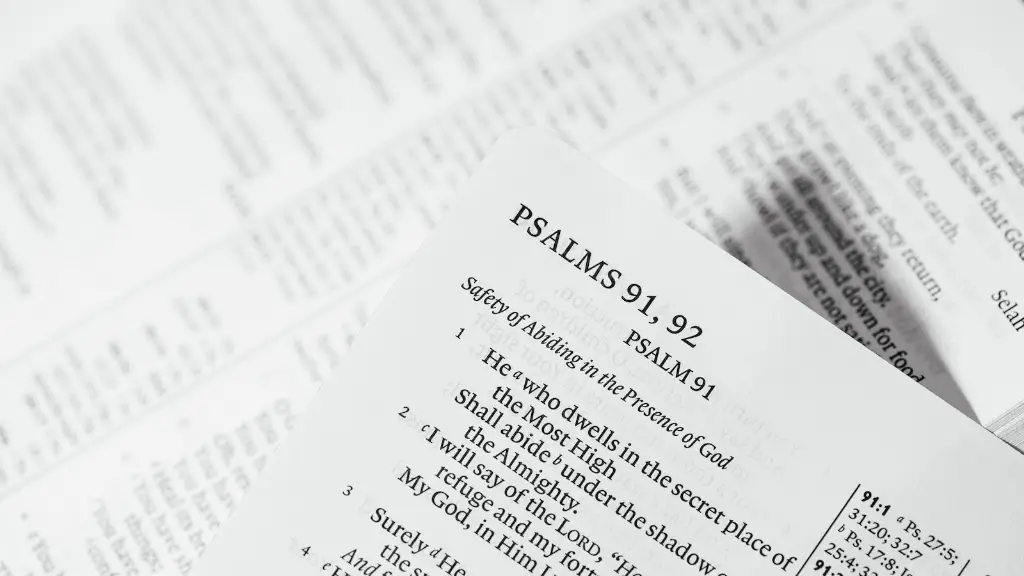The Bible is clear that praying in tongues is a gift from God that is to be used for His glory and for the edification of the church. 1 Corinthians 14:4 says, “He who speaks in a tongue edifies himself, but he who prophesies edifies the church.” This verse shows that tongues is a personal prayer language between us and God that can build us up spiritually. It is also a way that we can praise God and pray for things we wouldn’t otherwise be able to pray for. 1 Corinthians 14:2 says, “For he who speaks in a tongue does not speak to men but to God, for no one understands him; however, in the spirit he speaks mysteries.” Speaking in tongues is a supernatural way that God allows us to pray beyond our natural abilities and understanding.
The Bible says that praying in tongues is a way to speak to God directly, without having to use words. This type of prayer is also known as “glossolalia,” and it is a form of communication that is not limited by language. In other words, anyone can pray in tongues, regardless of what language they speak.
What does the Bible mean by praying in tongues?
The idea of speaking in tongues is mentioned in the Bible in 1 Corinthians:12 as a spiritual gift that a baptized person who has accepted Christ could receive from God and the Holy Spirit. This gift allows a person to speak a foreign language they otherwise have no knowledge of.
The second instance is Acts 2:4, where the disciples of Christ “began to speak with other tongues, as the Spirit gave them utterance.” This event is considered the birthday of the church, and the beginning of the spread of the gospel. The third instance is Acts 10:46, where Cornelius and his household speak in tongues as the Holy Spirit falls upon them. The fourth instance is Acts 19:6, where the disciples of John the Baptist speak in tongues as the Holy Spirit falls upon them. The fifth and final instance is in 1 Corinthians 14:2ff, where Paul instructs the church regarding the proper use of tongues in worship.
The biblical practice of speaking in tongues is a sign of the Spirit’s work in the life of a believer. It is a way for the believer to connect with God and to share the gospel with others.
Is praying in the spirit the same as praying in tongues
The apostolic injunction to “pray in the Holy Spirit” is a commandment for all Christians to pray in tongues. This is a separate and distinct prayer language from “praying in the Holy Spirit.” “Praying in tongues” is a supernatural gift of the Holy Spirit that allows the believer to pray for and intercede for others with a direct, personal connection to God.
The Bible gives us a clear instruction to build ourselves up on our most holy faith and to pray in the Holy Spirit. Speaking in tongues is a great way to stimulate our faith and to learn how to trust God more fully. When we speak in tongues, we are exercising our faith because we are depending on the Holy Spirit to direct our words. This is a great way to grow in our faith and to learn to trust God more fully.
What happens when a person prays in tongues?
Praying in tongues is one of the most effective ways to edify yourself. The Holy Spirit resides in your spirit and edifies you from within. The word ‘edify’ means to improve, build up (like building a house), strengthen, encourage, activate or stir up. It also means to charge. When you pray in tongues, the Holy Spirit is able to work more effectively in your life and you will be better able to resist temptation and overcome obstacles.
Glossolalia, or speaking in tongues, is a phenomenon that has been reported throughout history and across cultures. While the exact nature of glossolalia is still not fully understood, it is generally agreed that it is a form of speech that is not constrained by the normal rules of grammar or syntax. Glossolalia is often associated with states of intense religious experience, and has been reported in a wide variety of religious traditions. While some believe that glossolalia is a form of divine communication, others see it as a way to access a deeper level of communication with the divine.
What does Jesus say about speaking in tongues?
If you speak in tongues, you are not speaking to people but to God, because no one can understand you. You are uttering mysteries with your spirit. However, if you prophesy, you are speaking to people for their strengthening, encouragement, and comfort. Therefore, if you speak in tongues, you are edifying yourself, but if you prophesy, you are edifying the church.
Southern Baptists have a policy that prohibits its missionaries from praying in tongues because they believe that the biblical gift of tongues was always “a legitimate language of some people group.” This policy is in place in order to maintain the doctrinal purity of the Southern Baptist Convention.
Which churches believe in speaking in tongues
Glossolalia, or speaking in tongues, is a phenomenon that has been reported throughout history and across cultures. While it is most commonly associated with Pentecostal Christianity, it has also been reported in other Christian sects, as well as in other religions such as paganism, shamanism, and the God Light Association in Japan.
There is no one specific interpretation of glossolalia, but it is generally seen as a form of divine communication or a way to connect with the divine. For some, it is a way to receive guidance or direction from God; for others, it is a way to express emotions or prayers that cannot be spoken in words. Whatever the case may be, speaking in tongues is considered a gift from God that can be used for worship, guidance, and intercession.
The Gift of tongues is a miraculous faculty granted by the Holy Spirit to a person, allowing the person to speak multiple languages that the person did not previously know. This gift allows Christians to communicate the Gospel to people of other cultures and language backgrounds. The Gift of tongues is a powerful tool for evangelism and outreach.
How do you receive the gift of speaking in tongues?
When you seeking guidance from the Lord, it is best to intercede in tongues and then listen to what the Spirit seems to be saying. You can also try singing in the Spirit, letting the Lord supply the melody as well as the words. Ask the Lord to give you the interpretation of what you are praying in tongues.
When we pray in tongues, our spirit is praying but our understanding is not engaged. This is a way to pray that is purely from the heart, and it is a very powerful way to connect with God. However, we can also pray with our understanding, and this can be just as powerful. We can also sing with our spirit, and this can be a very beautiful and moving experience.
What happens to the brain when you speak in tongues
According to Dr. Andrew Newberg, glossolalia (speaking in tongues) is similar to other trance-like states in which frontal lobe activity diminishes and the person loses their sense of purposeful performance. This suggests that brain function plays a role in speaking in tongues, and that it may be more than just a meaningless jumble of syllables.
The Bible clearly teaches that not everyone is given the gift of tongues (I Corinthians 12:29-30). Therefore, it is dangerous to insist that tongues are the only necessary sign of the work of God’s Spirit in a person’s life. There may be other gifts and evidences of the Spirit’s work that are just as valid and important, even if tongues are not part of the picture. Let us not limit the work of the Spirit or ignore what He may be doing in and through His people.
Are people who speak in tongues crazy?
It is often assumed that people who speak in tongues are mentally unstable. However, studies suggest that this is not the case. In fact, people who speak in tongues rarely suffer from mental problems. This suggests that speaking in tongues is not a sign of mental instability, but is instead a sign of religious or spiritual devotion.
And all of a sudden my spirit was stirred And I didn’t know why
And my spirit is third and so I am led by the spirit
And I don’t know where I’m going but I know that I am following the path that has been set before me
And all of a sudden I am filled with a peace and a knowledge that everything is going to be alright
And all of a sudden I am no longer afraid
And all of a sudden I know that I am exactly where I am supposed to be
Who was the first person to speak in tongues in the Bible
It was common for me to pray the verses while praying, and it was as if hands were laid upon my head that the Holy Spirit fell upon me and I began to speak in tongues, glorifying God I talked several languages, and it was clearly manifest when a new dialect was spoken.
This was the experience of Agnes Ozman, a Pentecostal pioneer who spoke in tongues for the first time in 1901. She was an important figure in the early days of the Pentecostal movement and her testimony helped to spread the Pentecostal message around the world.
Most religious scholars and historians agree with Pope Francis that the historical Jesus principally spoke a Galilean dialect of Aramaic. Through trade, invasions and conquest, the Aramaic language had spread far afield by the 7th century BC, and would become the lingua franca in much of the Middle East.
Warp Up
The Bible is clear that praying in tongues is a gift from God that is to be used for the building up of the church (1 Corinthians 14:4). It is a prayer language that is given to us by the Holy Spirit, and it is a way for us to communicate directly with God. When we pray in tongues, we are not dependent on our own understanding or knowledge, but we are relying on the Holy Spirit to intercede for us. This is a powerful way to pray, and it is something that we should all seek to do.
The bible says that praying in tongues is a way to speak to God directly, and it is a way to build up the church.





